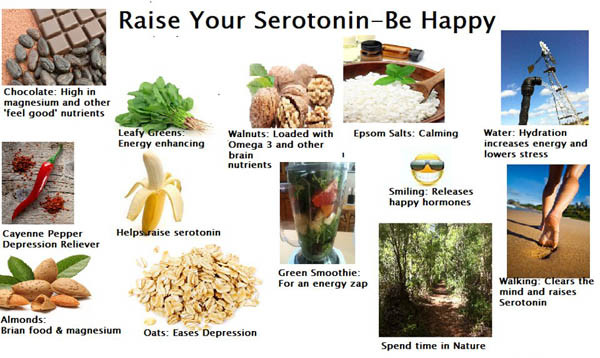
Are you feeling sad or SAD (seasonal affective disorder) this festive period? You’re not alone. The longer nights and shorter days could be partly to blame for those in the northern hemisphere. For many living in western cultures celebrating Christmas; the pressures of presents and other family expectations badly balanced with many jobs experiencing the seasonal rush can all be a bit much.
Don’t let stress or sadness build-up: there’s many ways you can cheer yourself up. This article focuses on using diet to naturally increase serotonin levels, helping you lift yourself up. Don’t forget exercise, sleep, meditation and many other things can help too. We’ve written a broad overview of natural approaches to stress management you might be interested in too.
Contents
Serotonin smiles and its other subtle effects
Serotonin is a neurotransmitter that some of you may have heard of: many anti-depressant medicines help to increase your body’s natural production levels. But what is this naturally occurring neurotransmitter, and what does it do?
Serotonin is found naturally in humans, other animals and some plants and insects. Within the human body, much of it is synthesized within the intestines: it helps regulate their movements. Whilst having a happy gut does help our mood, its direct effects on our neurological functions are when it’s synthesized by the central nervous system.
Our bodies use serotonin in regulating moods, sleep and appetite; it’s also thought healthy serotonin levels help maintain and even increase our memory and capacity to learn. So, not only does it directly and positively affect mood: its indirect benefits of ensuring you have a healthy appetite, regular sleep and strong cognitive functions also help you feel happier.
Foods that naturally boost serotonin levels
Some foods naturally boost serotonin levels. These aren’t necessarily a replacement for drugs that boost serotonin, but they can help enhance their effects; and can negate the need for artificial enhancement, and provide a natural boost for anyone feeling low. So, instead of feeling sad, why not eat your blues away with some of these mood-lightening foods?
Chocolate
Chocolate, in particular the cocoa contained within it, has been proven to have several health benefits – including boosting serotonin levels. As the health benefits come from cocoa, the darker the chocolate; the higher concentrations of goodness and the lower levels of sugar, fat and dairy. In fact, many dark chocolates don’t have any dairy!
As well as helping naturally boost serotonin levels, research from the University of California has highlighted that chocolate’s flavanols help to increase nitric oxide levels within the blood; promoting smoother blood flows and opening-up arterial routes, helping make you feel relaxed.
Greens cancel blues
Vitamin B6 helps to raise serotonin levels and release feel good chemicals. Predominantly found in leafy green vegetables like kale, and in fish, poultry and whole grains, eating greens can chase away the blues. So for every action, there is a reaction: not consuming enough foods rich in folate decreases serotonin in your brain. Hence, you can trust that with regard depression you are what you eat. Actually, folate deficiency is a common nutrient deficiency in the United States, linked to depression and anxiety. Leafy green vegetables and starchy beans, such as garbanzos, kidney and black beans are rich in folate, but the cooking process can destroy this. Enjoy leafy greens raw as often as possible, and sprouted beans are recommended for maximum blues beating!
Proteins
As an essential amino acid, Tyrosine helps protein to build. It’s primarily found in all of the protein sources such as dairy products, meats & poultry and nuts. Essentially, its job is to encourage your brain to release dopamine and norepinephrine; neurotransmitters that act as stimulating substances to the brain. Many people with depression and related ills feel that they lack ability to concentrate, and tyrosine can increases awareness; making you feel more alert and even sharpening your thinking. The good news is that vegans can also find tyrosine-rich foods that help increase dopamine levels by consuming more almonds, avocados, bananas, lima beans, pumpkin seeds and sesame seeds.
Oily fish
No health food list is complete without the oily fish section. Particularly for ‘brain food’, cold-water fish like tuna, herring, salmon and mackerel have increased B vitamins, and are an excellent natural antidepressant. The B vitamins work to help trigger serotonin production, and are rich in the polyunsaturated fatty acid known more commonly as omega-3. Omega-3 fatty acids combine with the power of B vitamins to help stimulate serotonin release. As well as these strong sadness combatting two, eating oily fish will help boost your intake of the trace mineral selenium. Low levels of this mineral have been linked with depression, and other related conditions.
Brazil nuts
On the selenium note, vegans will find food sources of selenium include whole grain cereals and breads, but also nuts; especially the Brazil.
Complex carbs
One thing’s for sure: simple carbs are really not your friend when you’re trying to combat depression or winter blues. The resultant highs and lows directly related to consuming high sugar quotients mess with an already imbalanced system. Ironically, many people reach for ‘comfort food’, such as pastas, potatoes and biscuits, but ultimately these are doing more harm than good. However, Foods rich in complex carbohydrates help elevate your mood because of how they affect brain chemicals called neurotransmitters. The various nutrients found in complex carbohydrate foods help produce neurotransmitters that influence behaviour. One of the key ones, of course, is serotonin. Its job is to help regulate moods, sleep patterns and even appetite. So whole wheat pasta, brown rice and the legumes like lentils and garbanzos are rich in tryptophan; an amino acid that converts to serotonin in the brain. Filling up on these, the starchy root vegetables, such as sweet potatoes, corn and carrots will boost production of serotonin and help you keep full for longer.
Bananas
Bananas are famous depression fighters, which have high levels of the neurotransmitter tryptophan, which is converted into serotonin. Also rich in Vitamin B6, necessary for your body to synthesize its own serotonin, bananas’ main mood-enhancing powers come from these two components. On a more simple level, the sweetness coming from bananas helps satisfy the sweetness craving, whilst boosting feel good chemicals.
Liver
Not everyone’s cup of tea these days, liver is another food which contains high levels of B vitamins and folate, which are natural stimulants of serotonin production. Including this animal organ into a diet can help increase production of mood balancing chemicals within your brain. As we advise for all met, though offal too should come from organic suppliers, so you can be sure it has not had any added hormones or chemicals which may have adverse effects on your feel good!

Last word
As with most things in life, the serotonin diet comes down to striking a good balance of fresh fruits and vegetables, proteins and complex carbohydrates. The many foods available within this spectrum will help you to feel more balances. With any serious depression it is essential to visit a doctor, and these foods are aimed at supplementing other lifestyle changes. For example just 10 minutes of exercise can help to release endorphins, which make us feel better too. The power of sunshine again means that just 10 minutes of being outside will raise the body’s production of Vitamin D; leading to a sunnier disposition.
You might be interested to read: Natural Antidepressant and Anti-anxiety Herbs
